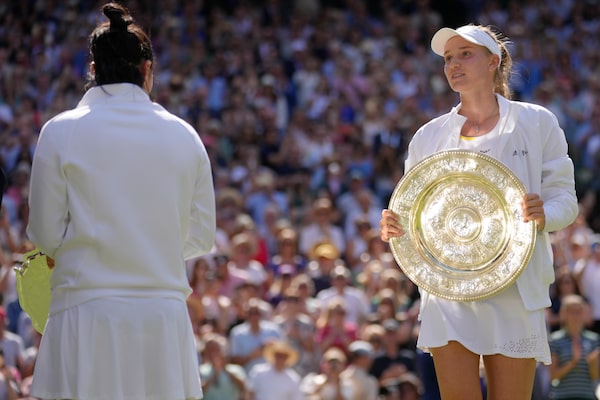
Kazakhstan's Elena Rybakina celebrates with the trophy after beating Tunisia's Ons Jabeur, left, to win the final of the women's singles on day thirteen of the Wimbledon tennis championships in London, Saturday, July 9, 2022.Kirsty Wigglesworth/The Associated Press
Until a week ago, Elena Rybakina was best known for being like a lot of other post-Soviet players. A big hitter with a flat aspect and zero visible emotion. Rybakina can play entire matches without making a peep.
In a sporting age where wild shows of emotion after winning the first set of a qualifier are celebrated as heroic displays, this sort of reserve can seem like a relief.
But you did figure that winning Wimbledon might unlock some hidden reserve of passion.
Nope.
Rybakina’s response was a mild fist pump and puffing out her cheeks. She didn’t even crack a smile.
Across the net, you felt pretty sure how her defeated opponent, Ons Jabeur, would have reacted. She might still be running around Centre Court high-fiving people right now. But it was – and then it very much wasn’t – Jabeur’s day. If the 27-year-old does not go on to win a major, the middle section of Saturday’s third set will haunt her.
In one of those delicious ironies, of course it was a Russian who won Wimbledon in the year Russians are banned. Rybakina plays under the flag of Kazakhstan, but that’s down to money. The Kazakhs agreed to fund her training, prompting her to decamp Moscow as a teenager and swap flags.
For the past week, she’s been pressed on that fact. This is where her approachable-Ivan-Drago vibe really pays off. She just walks on by those questions like she doesn’t understand them. After doing an entire presser in English on Saturday, she pulled the “sorry, my English is not the greatest” when it was brought up again.
But once she got going in the post-match, on-court interview, you got some sense of the actual person obscured by the remarkable athlete. Having begun to talk, Rybakina could not seem to stop. She rambled delightfully, telling people how nervous she’d been, and how glad she was that it was over.
“I don’t have words to say how happy I am,” Rybakina said, totally stone-faced.
(“I need to teach her how to celebrate really good,” Jabeur would say later.)
Rybakina thanked every single person in sight. When an interviewer prompted her to include her parents, Rybakina said: “To my parents. Without them, I wouldn’t be here.”
In that moment, you could feel the crowd finally starting to fall for the 23-year-old.
For Jabeur, there was only desolation. The Tunisian has become a de facto spokesperson of women’s tennis, renowned for her high spirits and charm.
For purely narrative reasons, it seemed right that this late bloomer should win on Saturday. Had she done so, she would have become the first Arab as well as the first African to win a major title. That’s a big slice of the world.
For the first set, it seemed like Jabeur would make history in style. But in the second, Rybakina settled and Jabeur began to waver.
In the third, up 3-2 with a break in hand, Rybakina went down 0-40 on her serve. That gave Jabeur three golden chances to put matters back on even footing. Instead, Rybakina reeled off five straight points.
The match wouldn’t be over for another half hour, but it ended there. You could see that on Jabeur’s face. The final score: 3-6, 6-2, 6-2.
There was also the matter of officiating, which wasn’t up to standard. At least a dozen calls were missed. The players were left challenging – or, crucially, not challenging – left and right.
“Don’t look at me,” analyst John McEnroe said when the missed calls were brought up late in the match. “I’m trying to keep quiet.”
In particular, chair umpire Aurelie Torte caught online attention for her advice. In two crucial instances, she advised Jabeur not to challenge calls she should have. On the list of things that will nag at Jabeur in the days to come, add indecision.
In a more sensible world, umpires would never offer advice on challenges. If they believe the call is wrong, they have the power to overrule. That they haven’t should suggest they think the correct call has been made. Which means they’re guessing on live TV. And why can’t the players do anything by themselves? What’s the point of limiting the number of challenges if there’s a phone-a-friend option before all of them?
It’s an easy fix – rule out all help – which means they won’t fix it. Nobody in sports likes anything that’s easy.
Afterward, it was obvious how agonized Jabeur was. She smiled through the pain of the post-match ceremony. But one loose comment, said in a joking tone - “Elena stole my title, but it’s okay” - let you know where her head was at.
Before Saturday, Jabeur wanted a major title. Now it’s fair to say she needs one.
For Rybakina, she has gone from an anonymous somebody to a brand name. One seems like a bit of good luck. But two would put her into Maria Sharapova territory. All she’d then is a publicist and a little bit of media training.
Perhaps more than any other high-profile global sport, women’s tennis is crying out for stars. Without Serena Williams, it’s hard to say who’s in charge. Or who’s on the in-charge committee. Let’s just say they’re taking applications.
Is Rybakina – only 23 years old and still developing - the one to restore order?
However this turns out for her, Rybakina has already added some post-Soviet mettle to the parade of wristwatch and make-up salespeople who comprise most of tennis’ elite. In this crowd, someone who just goes out and does their job with any seeming need for attention seems like a bold individualist.